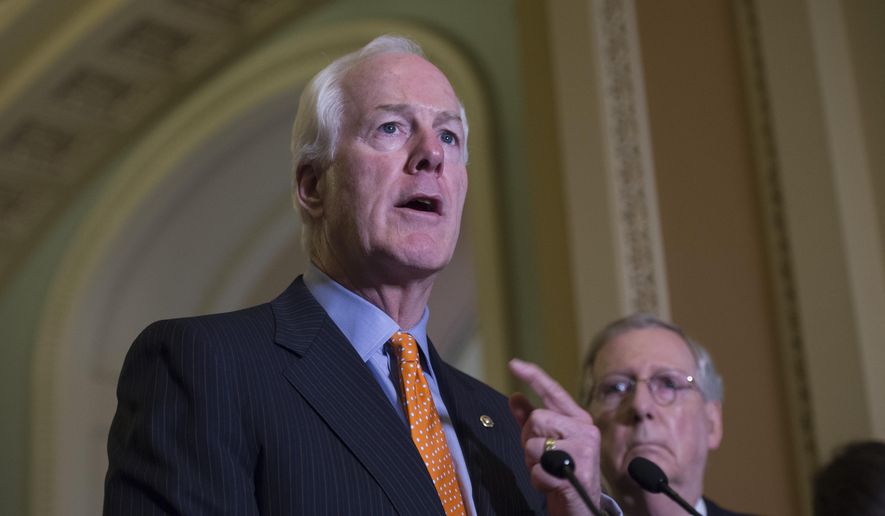The Republican author of a bill that would allow U.S. victims of terrorism to sue foreign governments blasted President Obama on Tuesday for fighting the measure, while the White House pointed eagerly to two key GOP lawmakers who also raised concerns about the legislation.
Mr. Obama’s opposition to the bill amounts to “asking the victims of 9/11 and their families to pay some of the political price for the president’s mishandling of our relationship with Saudi Arabia,” said Sen. John Cornyn, Texas Republican.
Hours after Mr. Cornyn spoke on the Senate floor, the president departed from Washington on his way to Saudi Arabia for a meeting with King Salman and leaders of other Gulf states. The Saudis are threatening to sell off as much as $750 billion in U.S. assets if Mr. Cornyn’s bill becomes law.
Democratic presidential candidates Bernard Sanders and Hillary Clinton say they support the Senate bill. Mr. Sanders is a senator from Vermont.
Mr. Obama said Tuesday that the legislation would invite retaliatory lawsuits.
“If we open up the possibility that individuals and the United States can routinely start suing other governments, then we are also opening up the United States to being continually sued by individuals in other countries,” the president said in an interview with CBS.
Mr. Cornyn said Mr. Obama “has worked to undercut progress on this legislation at every turn.”
“In light of his upcoming trip this week, it appears that the Obama administration is pulling out all the stops to keep this bill from moving forward before the president’s visit to Riyadh,” the senator said. “I wish the president and his aides would spend as much time and energy working with us in a bipartisan manner as they have working against us, trying to prevent victims of terrorism from receiving the justice that they deserve.”
Mr. Cornyn and Sen. Charles E. Schumer, New York Democrat, wrote the legislation known as the Justice Against Sponsors of Terrorism Act. Many U.S. officials say that a classified report on the 9/11 attacks implicates Saudi Arabian officials for supporting the suicide hijackers, 15 of whom were Saudi nationals.
The White House has said Mr. Obama would veto the bill. The administration believes the measure would encourage other nations to adopt similar laws that could expose U.S. diplomats, military personnel and taxpayers to lawsuits.
White House press secretary Josh Earnest also pointed to concerns raised Tuesday by House Speaker Paul D. Ryan, Wisconsin Republican, and Sen. Lindsey Graham, South Carolina Republican.
“In the current political climate, bipartisan support is rare,” Mr. Earnest said. “We’re obviously gratified that there are other Republicans who have taken a close look at this legislation and recognized the serious, unintended consequences that could result from its passage.”
Mr. Ryan told reporters Tuesday that lawmakers need to review the bill to “make sure we’re not making mistakes with our allies and that we’re not catching people up in this that shouldn’t be caught up in this.”
Mr. Graham has put a hold on the bill, which he co-sponsored, over concerns that changes could expose the U.S. to retaliatory litigation.
“I want to make sure that anything we do doesn’t come to bite us,” Mr. Graham told reporters. “Anything we do in this bill can be used against us later. So let’s say there’s a situation where you’ve got an American in a consulate or an embassy that’s got their own grudge against a government. We want to make sure that we’re not liable for that.”
But neither lawmaker said he is unalterably opposed to the bill. Ryan spokesman Doug Andres said the speaker “believes the legislation should be reviewed under regular order before decisions are made about the path forward.”
Mr. Cornyn disputed the White House’s argument that the bill would lead to lawsuits against U.S. personnel.
“That’s not true. This is a narrow piece of legislation, and it would not upend traditional principles of sovereignty,” he said.
Some families of 9/11 victims wrote a letter to Mr. Obama on Monday urging him to declassify the secret report on the terrorist attacks and to stand up to Saudi threats of economic retaliation for the legislation.
The 9/11 Commission said it “found no evidence that the Saudi government as an institution or senior Saudi officials individually funded” the attacks. The Saudi government denies any involvement and has called for the 28 pages to be released.
But White House Deputy National Security Adviser Ben Rhodes said in an interview this week that the Saudi government wasn’t “actively trying to prevent” wealthy Saudis from giving money to extremist groups before 9/11.
“So a lot of the money, the seed money if you will, for what became al Qaeda, came out of Saudi Arabia,” Mr. Rhodes said. “So basically, there was certainly at least kind of an insufficient attention to where all this money was going over many years from the government apparatus.”
• Dave Boyer can be reached at dboyer@washingtontimes.com.




Please read our comment policy before commenting.